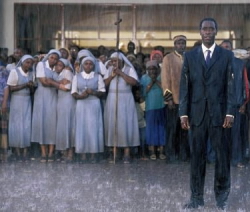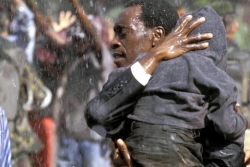Mark:
It’s not often a film like Hotel Rwanda comes along. Thinking back to the last time I felt this way watching a film, I remember films like Osama and Schindler’s List. Now, to that elite list, add Hotel Rwanda.
 Telling the story of the 1994 Rwandan civil war, through the eyes of a man married to ‘the enemy’, we are introduced to Don Cheadle’s Paul as the manager of the 5 star Hotel Mille Collines in Kigali, the capital city. Paul manages to bribe, barter and charm his way into getting almost anything his guests need, making him a much loved figure, and someone who has a lot of favours to call in when push comes to shove. Luckily, he is Hutu – the majority in numbers and seemingly in arms – but his wife is Tutsi. Despite the warnings of his family and colleagues, he doesn’t believe his countrymen could fall to such madness as would follow. Incited by radio broadcasts telling the Hutu to rise up and kill the ‘cockroaches’ (Tutsi), in April 1994 the massacre of almost 1 million Rwandans began.
Telling the story of the 1994 Rwandan civil war, through the eyes of a man married to ‘the enemy’, we are introduced to Don Cheadle’s Paul as the manager of the 5 star Hotel Mille Collines in Kigali, the capital city. Paul manages to bribe, barter and charm his way into getting almost anything his guests need, making him a much loved figure, and someone who has a lot of favours to call in when push comes to shove. Luckily, he is Hutu – the majority in numbers and seemingly in arms – but his wife is Tutsi. Despite the warnings of his family and colleagues, he doesn’t believe his countrymen could fall to such madness as would follow. Incited by radio broadcasts telling the Hutu to rise up and kill the ‘cockroaches’ (Tutsi), in April 1994 the massacre of almost 1 million Rwandans began.
Whilst there was a UN peace-keeping force in place, they weren’t allowed to fire their weapons, unless fired upon. Powerless to stop what is occurring around them, and in serious danger themselves, the Western governments withdraw them from Rwanda, thus ensuring the war will accelerate unabated. It seems this is the main point Terry George wanted to make – that we in the West, so comfortable and affluent in our own lives, must take responsibility for abandoning these people to such a fate.
And make it he does. With several differing techniques, he shows us our culpability – radio broadcasts of Clinton’s White House officials debating the definition of ‘genocide’, but refusing to recognise its occurrence; the cynical cameraman who tells Paul that we in the West will see this footage and go on eating our dinners. The most powerful scene brought me to tears, making me feel my own guilt, but also feeling the horror these people were faced with for the first time – like many in 1994, I was busy with other things, and barely noticed while all this occurred. These stories were a sidenote in my evening news, that I forgot as soon as the next ad break. When it occurs, the evacuation of Westerners from the Hotel Mille Collines, leaving anyone with the wrong passport behind to suffer at the hands of their own countrymen, is at once horrific and moving. It is the most personally affecting piece of cinema I have seen in years.
 Not satisfied with making us feel responsible for this horror, George shows us that simple acts of heroism can thrive in such circumstances. Paul is an unlikely hero; in the same vein as Oskar Schindler, he is a man who, when forced into an awful situation, reacted in the only way he could. By sheltering Tutsi refugees in his hotel, Paul risked everything – but how could he leave them to their fate outside the hotel grounds, like the UN forces? He couldn’t. So, by bribing army officials, threatening staff, and cajoling his Western contacts, he manages to save his 1268 family, colleagues and strangers.
Not satisfied with making us feel responsible for this horror, George shows us that simple acts of heroism can thrive in such circumstances. Paul is an unlikely hero; in the same vein as Oskar Schindler, he is a man who, when forced into an awful situation, reacted in the only way he could. By sheltering Tutsi refugees in his hotel, Paul risked everything – but how could he leave them to their fate outside the hotel grounds, like the UN forces? He couldn’t. So, by bribing army officials, threatening staff, and cajoling his Western contacts, he manages to save his 1268 family, colleagues and strangers.
Don Cheadle is a revelation as Paul Rusesabagina. He has always been an adequate supporting actor, but who knew he could pull off such a lead role? Well, he is stunning, carrying this film on his shoulders. Without Paul being so well played, this film would have fallen flat, and yet, because of Cheadle, it soars.
This is an exceptional film, but isn’t for someone looking for a fun evening with friends. That being said, it is so important, I believe it to be compulsory viewing.
Rating: